
A movie theater or cinema, also known as a movie house, cinema hall, picture house, picture theater, the pictures, or simply theater, is a business that contains auditoriums for viewing films for public entertainment. Most are commercial operations catering to the general public, who attend by purchasing tickets.

AMC Entertainment Holdings, Inc. is an American movie theater chain founded in Kansas City, Missouri, and now headquartered in Leawood, Kansas. It is the largest movie theater chain in the world. Founded in 1920, AMC has the largest share of the U.S. theater market ahead of Regal Cinemas and Cinemark Theatres.

2929 Entertainment, LLC. is an American integrated media and entertainment company co-founded by billionaire entrepreneurs Todd Wagner and Mark Cuban. 2929 maintains companies and interests across several industries including entertainment development and packaging, film and television production and distribution, digital and broadcast syndication, theatrical exhibition, and home entertainment.
United States v. Paramount Pictures, Inc., 334 U.S. 131 (1948), was a landmark United States Supreme Court antitrust case that decided the fate of film studios owning their own theatres and holding exclusivity rights on which theatres would show their movies. It would also change the way Hollywood movies were produced, distributed, and exhibited. It also opened the door for more foreign and independent films to be shown in U.S. theaters. The Supreme Court affirmed the United States District Court for the Southern District of New York's ruling that the existing distribution scheme was in violation of United States antitrust law, which prohibits certain exclusive dealing arrangements.
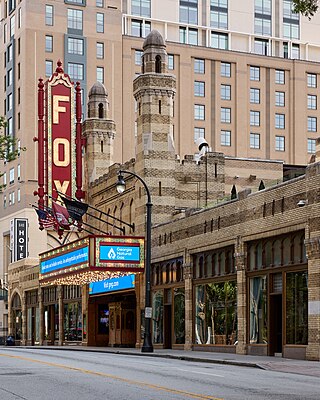
The Fox Theatre, a former movie palace, is a performing arts venue located at 660 Peachtree Street NE in Midtown Atlanta, Georgia, and is the centerpiece of the Fox Theatre Historic District.
Landmark Theatres is a movie theatre chain founded in 1974 in the United States. It was formerly dedicated to exhibiting and marketing independent and foreign films. Landmark consists of 34 theatres with 176 screens in 24 markets. It is known for both its historic and newer, more modern theatres. Helmed by its President, Kevin Holloway, Landmark Theatres is part of Cohen Media Group.
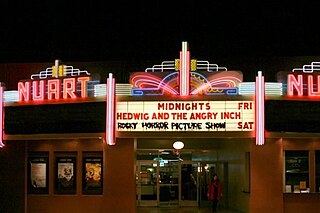
The Nuart Theatre is an art-house movie-theater in Los Angeles, California, United States. It is the flagship location of the Landmark Theatres chain in the United States.
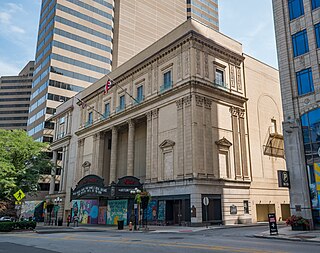
The Ohio Theatre is a performing arts center and former movie palace on Capitol Square in Downtown Columbus, Ohio. Known as the "Official Theatre of the State of Ohio", the 1928 building was saved from demolition in 1969 and was later completely restored. The theater was declared a National Historic Landmark in 1977.

The Chicago Theatre, originally known as the Balaban and Katz Chicago Theatre, is a landmark theater located on North State Street in the Loop area of Chicago, Illinois. Built in 1921, the Chicago Theatre was the flagship for the Balaban and Katz (B&K) group of theaters run by A. J. Balaban, his brother Barney Balaban and partner Sam Katz. Along with the other B&K theaters, from 1925 to 1945 the Chicago Theatre was a dominant movie theater enterprise. Currently, Madison Square Garden, Inc. owns and operates the Chicago Theatre as a 3600 seat performing arts venue for stage plays, magic shows, comedy, speeches, sporting events and popular music concerts.
Harkins Theatres is an American movie theater chain with locations throughout the Southwestern United States. Harkins Theatres is privately owned and operated by its parent company, Harkins Enterprises, LLC. The company operates 35 theaters with 487 screens throughout Arizona, California, Colorado, and Oklahoma. It is the 7th largest movie theater circuit in North America and the largest family-owned theater chain in the United States.

The Roxy Theatre was a 5,920-seat movie palace at 153 West 50th Street between 6th and 7th Avenues, just off Times Square in New York City. It was the largest movie theater ever built at the time of its construction in 1927. It opened on March 11, 1927 with the silent film The Love of Sunya starring Gloria Swanson. It was a leading Broadway film showcase through the 1950s and also noted for its lavish stage shows. It closed and was demolished in 1960.

The UC Theatre is a music venue on University Avenue near Shattuck Avenue in Downtown Berkeley, Berkeley, California, United States. From 1976 until 2001, it was a movie theater known for a revival house presentation of films. In 2013, The Berkeley Music Group was formed as a 501(c)(3) nonprofit organization with the mission to renovate and operate the UC Theater as live music venue. It reopened its doors on April 7, 2016.
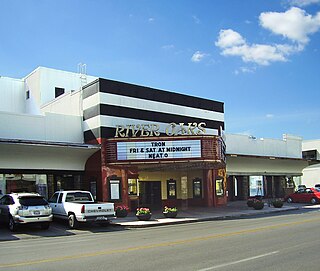
The River Oaks Theatre is a historic movie theater located in the River Oaks Shopping Center in the Neartown community in Houston, Texas, United States, east of the River Oaks community. The theater has three projection screens; one large screen, downstairs, and two smaller screens, upstairs.
ArcLight Cinemas was an American movie theater chain that operated from 2002 to 2021. It was owned by The Decurion Corporation, which was also the parent company of Pacific Theatres. The ArcLight chain opened in 2002 as a single theater, the ArcLight Hollywood in Hollywood, Los Angeles, and later expanded to eleven locations in California, Massachusetts, Maryland, and Illinois.
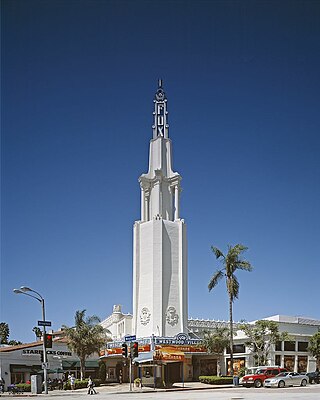
The Regency Village Theatre is a historic, landmark cinema in Westwood, Los Angeles, California in the heart of the Mediterranean-themed shopping and cinema precinct, opposite the Fox Bruin Theater, near the University of California, Los Angeles (UCLA). The Regency Theaters chain lease ended in July 2024. The Westwood Village Theatre has been the site for many Hollywood movie premieres in Los Angeles. The seating capacity of the cinema is about 1,400.

The Boston Opera House, also known as the Citizens Bank Opera House, is a performing arts and esports venue located at 539 Washington St. in Boston, Massachusetts. It was originally built as the B.F. Keith Memorial Theatre, a movie palace in the Keith-Albee chain. The chain became part of RKO when it was established just before the theater opened on October 29, 1928, and it was also known as the RKO Keith's Theater. After operating for more than 50 years as a movie theater, it was rededicated in 1980 as a home for the Opera Company of Boston, which performed there until the opera company closed down in 1990 due to financial problems. The theater was reopened in 2004 after a major restoration, and it currently serves as the home of the Boston Ballet and also hosts touring Broadway shows.

The Nimoy Theater, formerly known as Crest, Majestic Crest and Bigfoot Crest Theatre, is a movie theatre located in the Westwood neighborhood of Los Angeles, California. It was founded as the UCLAN in 1941, and was built for live performances but switched to a newsreel cinema during World War II. Through ownership changes, it has been known at various times as UCLAN Theatre, Crest Theatre, and Metro Theatre. The original 500-seat art deco style theater was designed by Arthur W. Hawes.

Charles Steven Cohen is an American real estate developer and film distributor.

The Neptune Theatre, formerly known as U-Neptune Theatre, is a performing arts venue in the University District neighborhood of Seattle, Washington, United States. Opened in 1921, the 1,000 capacity venue hosts a variety of events, including dance and music performances, film screenings, and arts education. It was primarily used for screening classic films prior to a 2011 renovation. In 2014, the theater and building were designated a Seattle landmark.